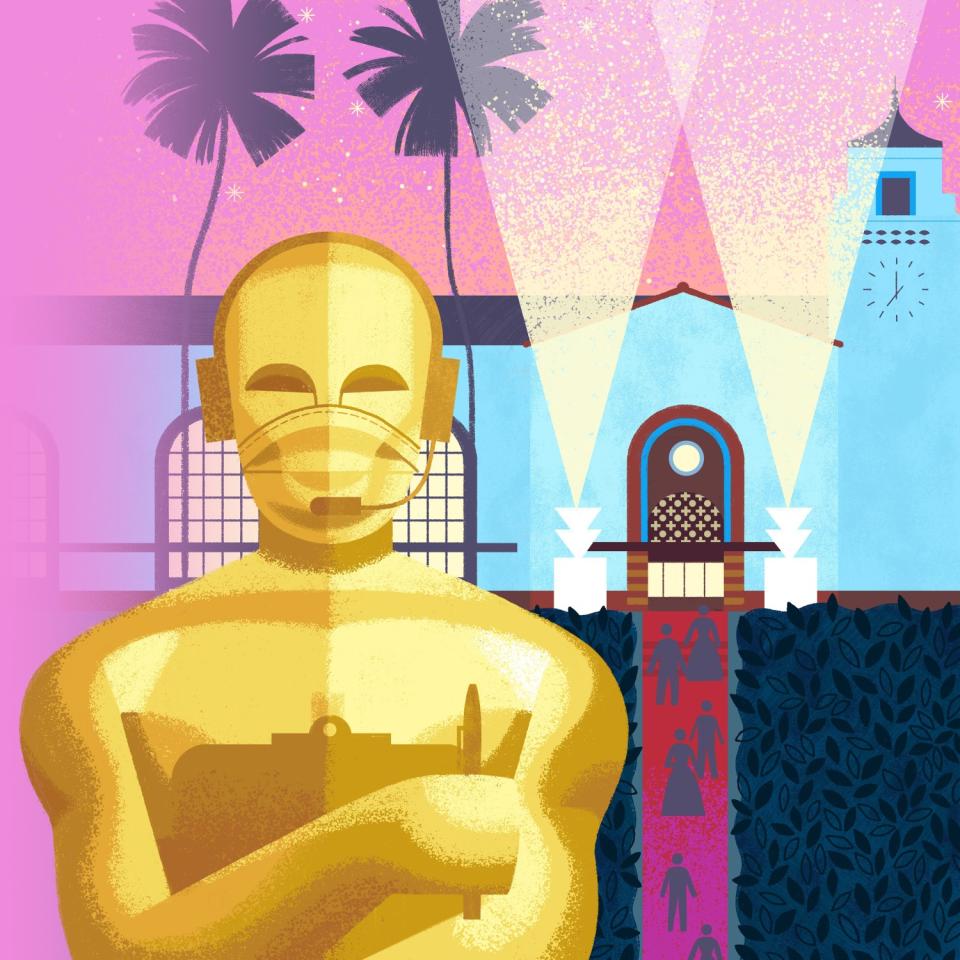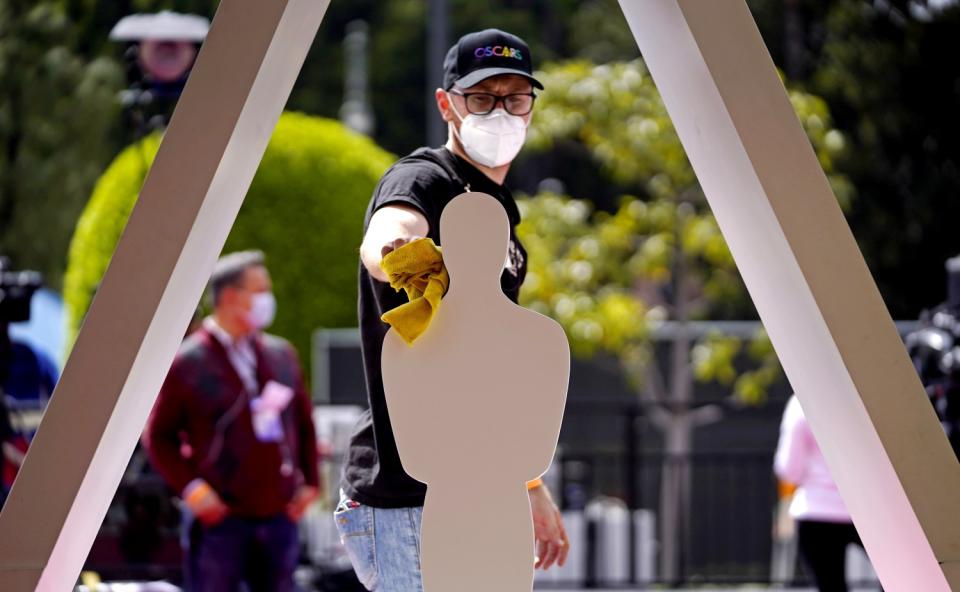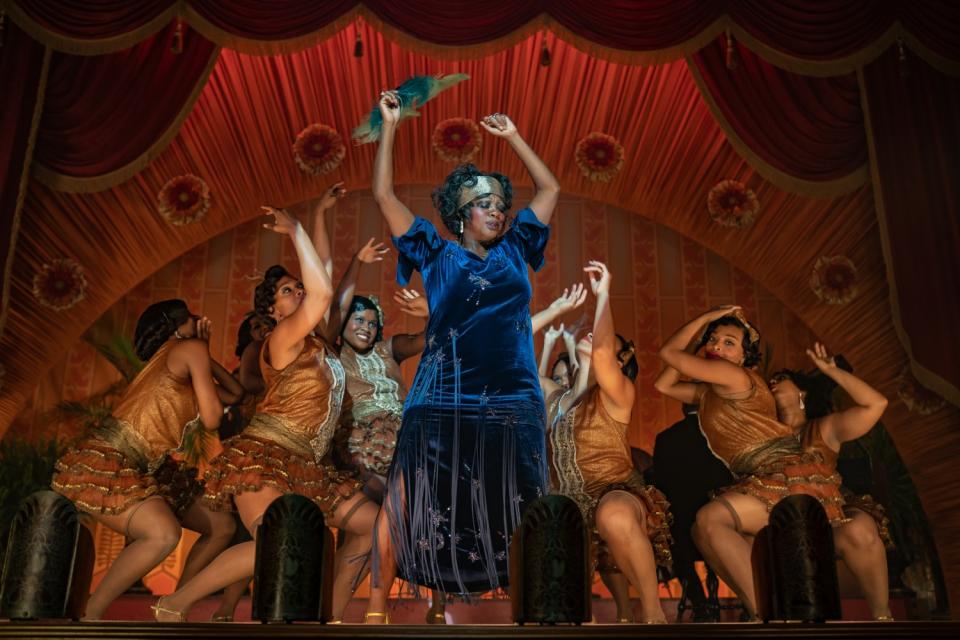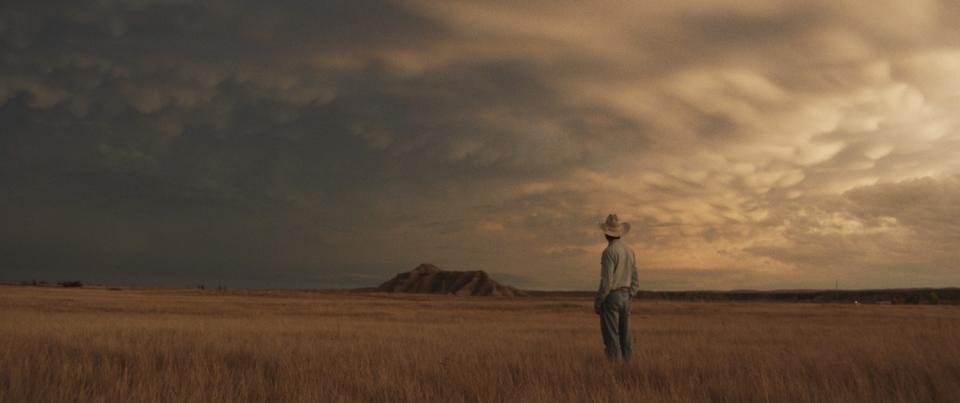Here's how a surreal Oscars 2021 season found relevance in a year without movie theaters

WITH A MOVIE INDUSTRY upended by the pandemic and growing pressures from streaming plus the push for diversity, the Oscars found meaning this season with films that struck a chord with our times. But will the show find an audience? That's just one big question people are asking about the ceremony, which airs live Sunday on ABC starting at 5 p.m. Pacific from downtown Los Angeles' Union Station and Hollywood's Dolby Theatre. Take a scroll through stories that tell a tale about an awards season like no other.
Yes, Oscar ratings will be abysmal. Here's what really matters

By MARY McNAMARA
Steven Soderbergh has promised the COVID-era Oscars will be a "movie" — but what kind?
IN ANY YEAR, producing the Oscars telecast can be a thankless job. No matter how you trick it out, the show is three-plus hours of live television, essentially an endless succession of people reading lists and making acceptance speeches. Start playing off winners mid-speech to stay on schedule and people complain; let winners talk and people complain even more when the show runs long.
Over the years, some shows have been better, some worse, but I applaud all who have agreed to take it on.
Especially Steven Soderbergh, Stacey Sher and Jesse Collins, who are producing the 93rd Academy Awards, the COVID Oscars.
Last year, the biggest question the Oscars faced was whether or not "Parasite" would become the first non-English-language film to win best picture (it did, along with three other awards.)
This year there are so many questions it's hard to know where to begin. Let's start with: Who's going to watch a show honoring a bunch of movies most people have not seen because movie theaters were closed for pretty much an entire year? READ FULL STORY
Are the 2021 Oscars doomed?

By JOSH ROTTENBERG AND GLENN WHIPP
Or will this year's Academy Awards prove the movies have a bright future?
IN THE RUN-UP to the Academy Awards, Hollywood is normally bursting with excitement. Red carpets are vacuumed. Gowns are fitted. Speeches are nervously practiced in front of mirrors.
But while much of that preparation has still been happening — the show, after all, must go on — Sunday’s Oscars ceremony is taking place against a backdrop that is far from festive. With the film industry struggling to emerge from a pandemic that has upended business models and decimated balance sheets, the overall mood around town heading into the show, which will be held in person at Union Station, the Dolby Theatre and via numerous satellite hookups around the world, is more one of existential anxiety than razzle-dazzle celebration. ...
But the planners of this year’s Oscars are not merely looking to honor the current crop of nominees, many of which may be unfamiliar to viewers given that movie theaters have been closed for the last year. They are hoping to give the entire industry a proverbial shot in the arm by reminding people around the globe that movies still matter. The show’s tagline — “Bring Your Movie Love” — carries a whiff of pleading, as if the Academy of Motion Picture Arts and Sciences were soliciting prayers for an ailing loved one. READ FULL STORY
Oscar predictions: Who will win? Who should win?

By GLENN WHIPP
Our expert's picks in all 23 categories
THE PRODUCERS OF this year's Oscars have promised that the first 60 seconds of the show will “make your knees buckle." As my knees have remained firmly in place for the many (so many) years that I've watched the Academy Awards, I cannot begin to predict what that moment might entail. As Steven Soderbergh is one of the brave (foolhardy?) folks running this ceremony, perhaps we could be looking at a cast reunion from one of his movies?
And, sure, OK, a "Che" reunion might make me a little giddy. (Not the Soderbergh movie you were thinking of? Sorry, comrade.)
While I can't predict that knee-buckling moment, I can comb through all 23 Oscar categories (yes, one fewer than previously as the academy combined sound mixing and sound editing) and offer some thoughts. Keep the smelling salts handy. READ FULL STORY
‘It’s about the emotion ... the energy’

By JOSH ROTTENBERG
PRODUCING THE OSCARS is a difficult and often thankless job even in a normal year — and as you may have noticed, with a global pandemic upending life in Hollywood and around the world, this year has not exactly been normal.
“My attitude coming in was, you have to surrender to the fact you’re just going to be a human piñata,” director Steven Soderbergh, who is producing the 93rd Academy Awards alongside Stacey Sher and Jesse Collins, told The Envelope over Zoom this month. “And if you do surrender to that, you’re kind of free to do what you want. We don’t read the comments section, because that way lies madness.” ...
The stakes for this year’s Oscars are enormous. With movie theaters across the country starting to open their doors again, the movie business desperately needs the kind of shot in the arm that a glittering celebration like the Oscars can provide. But at the same time, ratings for other pandemic awards shows have been dismal, and this year’s crop of nominees lacks the sort of massive blockbusters that could entice a large viewership. READ FULL STORY
Union Station prepares for its Oscars close-up

By DEBORAH VANKIN
Vibrant, historic details, hidden for decades, are uncovered in a restoration
IT WAS AFTER midnight on a June evening in 2017 when the discovery was made. Union Station’s entry vestibule — an ode to Mission Moderne architecture, with its Spanish tile floor and draping Art Deco chandeliers — was virtually deserted. A restoration cleaning crew was wiping down the tarnished ceiling panels, dim, brownish squares that hadn’t been cleaned in nearly 80 years and were so caked with tobacco tar and dirt that they appeared to be solid wood rather than painted plaster.
One of the two workers, perched on a boom lift about 40 feet high, gently wiped a section of the ceiling with cleaning solution, causing a swath of bright orange to appear. Repeated cleaning soon revealed bits of yellow and peach shining through. Below the darkened surface, there was a vibrant painting, original to the architecture, bearing a floral pattern.
“It was like, wow! We knew there was something under there, but we had no idea it was this brightly colored pattern,” said Dyana Elam, construction manager of Union Station. READ FULL STORY
Architecture of the unsettled

By CAROLINA A. MIRANDA
Oscars' best picture nominees reveal an America in transition
THE FIRST TIME you see Jacob and Monica's house in "Minari," it's from the vantage point of a moving car. Images of bucolic landscape hugging a country lane give way to an open field. In the middle of that isolated field sits the couple's future house, which is neither a brightly painted country farmhouse nor charming log cabin.
Instead, the camera settles on a wheezing, putty-colored mobile home. Its lack of skirt siding reveals the mechanism by which it was towed into place. "Look, wheels!" the kids helpfully exclaim, as Monica, their mother, portrayed by Yeri Han, looks on in horror.
This isn't what you promised," she says to her husband, Jacob, played by Steven Yeun. ...
In a movie season turned upside down by COVID-19, it seems right on brand that the eight best picture nominees for this year's Academy Awards all channel a feeling of the unsettled — in their narratives, but also in the architecture that they depict. READ FULL STORY
The complicated lives of Black music legends power Oscar's acting noms

By MIKAEL WOOD
This year, more than ever, Oscar voters are drawn to portrayals of musicians in pain
WHEN VIOLA DAVIS and Andra Day face off for the lead actress trophy at Sunday’s 93rd Academy Awards, the competition will mark just the second time that two Black women have been nominated in that category in the same year.
That’s not the only bit of Oscars history they’ll be making nearly half a century after Diana Ross and Cicely Tyson both received nods in 1973. For the first time at the Academy Awards, the performances nominated for lead actress include two portrayals of famous real-life musicians: the pioneering blues singer Ma Rainey (as played by Davis in “Ma Rainey’s Black Bottom”) and the legendary jazz vocalist Billie Holiday (as played by Day in “The United States vs. Billie Holiday”).
The men’s categories are crowded with music too. In supporting actor, Leslie Odom Jr. is up for his role as yet another real-life star, gospel and soul great Sam Cooke, in “One Night in Miami…” Add the two actors tapped for their lead performances as fictional characters — the late Chadwick Boseman’s jazz trumpeter in “Ma Rainey” and Riz Ahmed’s drummer experiencing hearing loss in “Sound of Metal” — and fully a quarter of the nominations for Hollywood’s highest acting honors recognize depictions of musicians. READ FULL STORY
The magic of Chloé Zhao

By CARLOS AGUILAR
How the Oscars favorite gets brilliant performances from non-actors
OPEN SKIES TINGED with the intense hues of twilight hang above expansive American landscapes in the films of Chloé Zhao.
On the ground, in vast pastures or endless roads untraveled, her humanistic gaze points to the keepers of simpler lifestyles, people embracing worldviews detached from the preoccupations of the urban mainstream. She is a beholder of the unseen.
Currently up for four Academy Awards for “Nomadland,” the Chinese-born writer, director, editor and producer has perfected an artisanal method to mold emotional truth into plainspoken yet soul-stirring fiction. Her curiosity about others is the not-so-secret golden touch.
There’s no traditional casting process involved, especially not for her first two efforts — 2015's "Songs My Brothers Taught Me" and 2017's "The Rider" — whose stories originated from individuals in their inimitable life orbits.
Anchored on empathic understanding, Zhao cultivates relationships. The filmmaker, as she gets to know them, elicits the essence of her subjects, who later become first-time actors, and guides their lived experiences into a dramatic narrative. The outcome is scripted but the raw material is fact. There’s a personal rediscovery for the men and women onscreen as they interpret themselves in Zhao's fabricated versions of their realities. READ FULL STORY
Alcohol boot camp, bittersweet friendships and 'Another Round'

By MARK OLSEN
Director Thomas Vinterberg and actor Mads Mikkelsen on the search for catharsis
IT’S A GENUINE idea, put forth by Norwegian psychiatrist Finn Skårderud, that humans naturally have a blood-alcohol level lower than what it should be. In the Danish movie “Another Round,” that theory is interrogated in unexpectedly emotional ways.
Reuniting director Thomas Vinterberg and star Mads Mikkelsen, who previously joined forces on the Oscar-nominated "The Hunt," "Another Round" ... is nominated for two Academy Awards, international feature and director.
Mikkelsen plays Martin, a middle-aged schoolteacher who’s felt the spark dim from his marriage, his work and his life. So he and some teacher friends decide to put Skårderud's notion to the test with a drinking regimen. What at first seems a jolly and surprisingly effective idea begins to take on a darker and destructive cast as they continue with their experiment. READ FULL STORY
This story originally appeared in Los Angeles Times.

